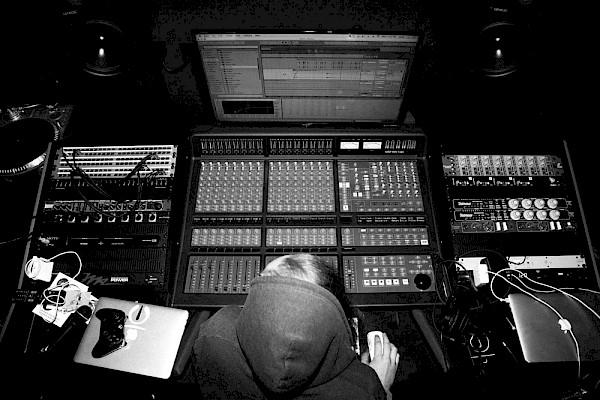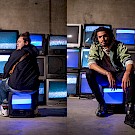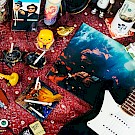 EYRST's shared A/D Agency Recording Suite in SW Portland: Photo by Connor MeyerPortland’s hip-hop scene has taken a page from history and added a modern collaborative twist to the formation of their creative coteries. Whether inspired by the production houses of Motown and Stax or imitating more recent mainstream success stories in the hip-hop and R&B world—from L.A. Reid and Babyface’s LaFace Records to Diddy’s Bad Boy Records to Kanye's G.O.O.D. Music—a group of collective-minded labels are on the rise, with studio operations in tow.
EYRST's shared A/D Agency Recording Suite in SW Portland: Photo by Connor MeyerPortland’s hip-hop scene has taken a page from history and added a modern collaborative twist to the formation of their creative coteries. Whether inspired by the production houses of Motown and Stax or imitating more recent mainstream success stories in the hip-hop and R&B world—from L.A. Reid and Babyface’s LaFace Records to Diddy’s Bad Boy Records to Kanye's G.O.O.D. Music—a group of collective-minded labels are on the rise, with studio operations in tow.
Talent development—basically access to the tools that aid in the growth of artists—is integral. These days, that support comes in the form of songwriting, producing beats, setting aside studio time, making music videos, strategizing about releases, and managing social media. But above all, the foundational ethos is more minds are better than one.
For EYRST, “Our artists are priority number one,” says president Taylor Dutton. “They can book as much studio time as they want, when they want.” That studio is downtown’s A/D Agency Recording Suite, which lead producer Neill Von Tally shares with electropop wizard Karl Kling.
 EYRST producer Neill Von Tally behind the board at A/D Agency Recording Suite: Photo by Connor MeyerHaving a dedicated studio available to EYRST artists “that has equipment and instruments for them to explore” has been of “the utmost importance,” Dutton continues. “A studio space allows for a lot of experimentation as well as collaboration that would otherwise be more difficult.”
EYRST producer Neill Von Tally behind the board at A/D Agency Recording Suite: Photo by Connor MeyerHaving a dedicated studio available to EYRST artists “that has equipment and instruments for them to explore” has been of “the utmost importance,” Dutton continues. “A studio space allows for a lot of experimentation as well as collaboration that would otherwise be more difficult.”
Burn Money Music came onto the scene a year ago and has followed a similar course while operating two studios. NW Portland’s The Annex is a commercial space open to “anyone with any type of budget,” according to label rep Aleca Navarrete, while the label’s headquarters houses another studio that “is primarily dedicated to label artists and producers” and always available, based on a schedule created by the head engineer.
The model really syncs up nicely with the creative process as having a reserved recording space “allows for freedom to create whenever inspiration or a vibe takes place, instead of calling around for session hours,” Burn Money’s vice president Jay Dixon says. “It also allows for creating a fully functional multimedia space that artists can utilize. Microphones, guitars, drums, monitors for audio and visual playback are all available to artists for creation. Having a comfortable work space with equipment you can rely on to record a quality, industry-standard sound has been extremely helpful for all artists to create.” All of which has also aided in the production of new installments of the label's Bridge City Cypher series, which features artist from the Burn Money roster alongside special guests—watch below.
Recent upstart It’s Future Time has sought to kindle synergy through monthly happy hour sessions, a place for “friends and crew to gather and talk about what were working on, or want to work on, or need help with,” tells co-owner Anthony DeMarco, who’s production handle is AED. “It seems to really kick-start the inspiration amongst the crew. These get togethers help us to form a list of what needs doing, and who needs what for their project, depending on how far into the process they are.”
It’s Future Time then has two private, ever-evolving studios in Milwaukie “full of lots of instruments, synths, samplers and gear,” DeMarco says. “The main studio stays open and available to all the artists.”
These open-door policies have cultivated collaboration, whether it’s Daren Todd of It’s Future Time working as songwriter for another artist, or EYRST’s Ripley Snell and his “ad libs hiding on a ton of our music, and he isn't the only one,” Dutton says. “I would say that having artists in the studio together more often than not is a motivating factor and really helps to bring out everybody's best work.” Beyond the common feature, EYRST artists have dropped multiple collaborative projects such as Rare Treat (Myke Bogan, Neill Von Tally and The Last Artful, Dodgr) or a forthcoming shared EP from Blossom and Ripley Snell—listen to the first chilled-out single from Clout Atlas :: Dormiveglia (out July 13) below.
“A strong work ethic is key!” adds Burn Money CEO Jason Navarrete, encouraging artists to get “into the routine of working daily, and always doing something beneficial toward their music.”
As these and other Rose City crews—like Rare Vibe, FRSH TRB and Hive Mind Collective—continue to support each other’s craft and their local communities, the general consensus is a willingness to adapt. The exact configuration of the studio-label hybrid may shift over time along with the creative process and music industry. But together—sharing knowledge, skills and “helping each other work to our strengths,” as DeMarco says—there’s power in numbers.








